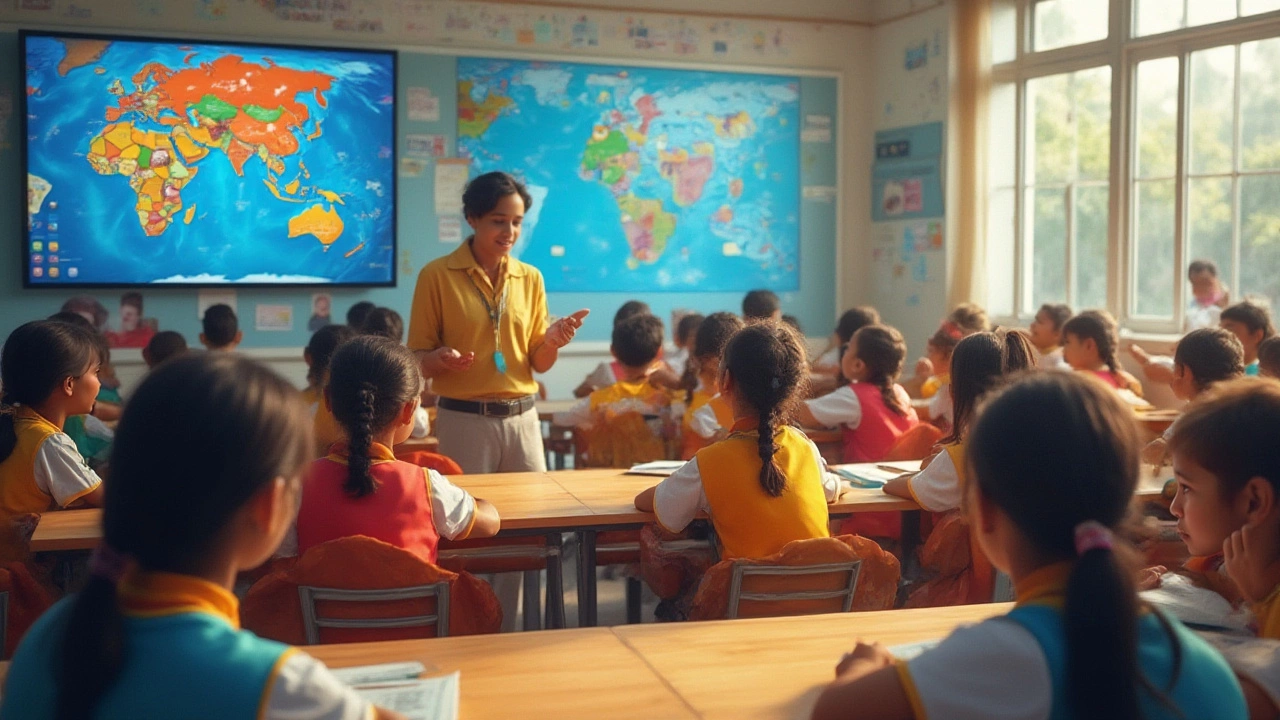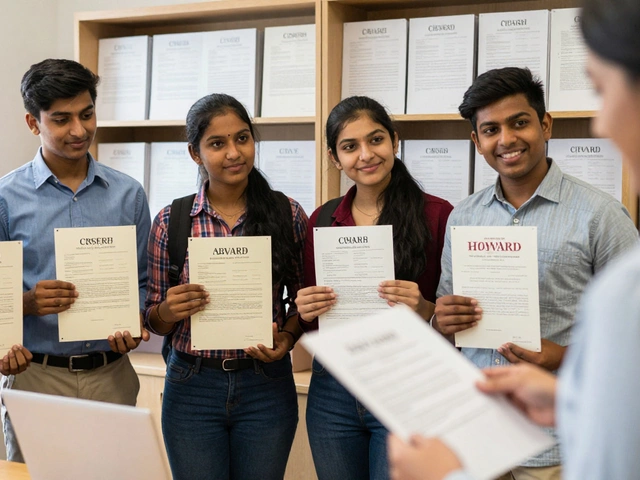Did you know you can find the CBSE board—not just in India but scattered across several continents? That’s right. Many parents still think CBSE means a typical Indian school, but it’s not always the case. Somewhat quietly, CBSE schools have been popping up in places like Dubai, Singapore, and even Africa, giving Indian students and expats a familiar learning path almost anywhere they move. So what made this Indian board so mobile? How did it get here? And what should you know if you’re looking for a CBSE school outside India?
CBSE: Not Just an Indian Affair
Most people see CBSE—the Central Board of Secondary Education—as India’s most recognizable educational name. Started in 1962, people mostly associate it with Indian cities like Delhi, Mumbai, and Bengaluru. However, more than 220 CBSE schools operate outside India as of 2025, according to the board’s official site. These aren’t just small setups—some of the world’s largest Indian international schools follow the CBSE syllabus. It’s a response to one of the world’s largest diaspora communities. The Indian population abroad reached over 32 million by July 2025, according to India's Ministry of External Affairs. Many of these families want recognizable, seamless school transitions for their kids when moving countries.
Emirati cities are home to huge clusters of CBSE schools. In Dubai, 34 schools run the CBSE program, according to the Knowledge and Human Development Authority (KHDA). Singapore, Malaysia, Qatar, Bahrain, Oman, and Saudi Arabia also offer the syllabus through private institutions. The reason is simple: it allows Indian parents to keep their children on the same academic track as their peers back home. Also, many non-Indian communities are attracted to the syllabus’s perceived balance between science, math, humanities, and languages, which can stand up to other international boards.
The CBSE doesn’t shy away from international licensing. It encourages Indian curriculum schools abroad, provided they meet strict affiliation rules, including infrastructure quality, faculty qualifications, and adherence to the Indian school calendar. Some of these requirements are slightly modified to suit local needs, but the core remains the same.
How the CBSE Board Travels Across Borders
Transporting a school board syllabus across oceans isn’t as simple as copying textbooks and buying uniforms. CBSE’s global presence is the result of significant strategy and some fascinating history. For example, the first recognized foreign CBSE institution dates back to the late 70s, catering mostly to Indian embassy staff’s families in countries like the UAE and Saudi Arabia. Now, most CBSE international schools are large, purpose-built private campuses with state-of-the-art facilities.
Why are overseas parents picking CBSE over other boards like ICSE, IGCSE, or IB? Familiarity matters hugely. CBSE’s curriculum syncs with top Indian entrance exams—think IIT-JEE and NEET. For students returning to India after a few years, this makes repatriation much smoother. For others, it offers a pathway to universities in India and beyond, as many global colleges recognize the CBSE mark scheme.
This international expansion is tightly regulated by the board itself. Schools applying for CBSE affiliation outside India must follow detailed rules, which include employing teachers recognized by India’s National Council for Teacher Education and ensuring campus safety that matches Indian standards. Every three years, schools must renew their affliation to prove ongoing compliance. Here’s a quick snapshot of the top five countries hosting CBSE schools, aligned with the number of CBSE institutes as of 2025:
| Country | Number of CBSE Schools |
|---|---|
| UAE | 78 |
| Saudi Arabia | 38 |
| Oman | 22 |
| Qatar | 17 |
| Singapore | 6 |
Numbers may look fairly modest, but each of these schools typically enrolls hundreds (sometimes thousands) of students.

CBSE vs. Other International School Boards
Global families can usually choose between a few big school boards: CBSE, ICSE, IGCSE (Cambridge), or IB (International Baccalaureate). Each has a different vibe and focus. CBSE often stands out in countries with larger Indian expat communities due to its relevance and support for Indian government-run entrance exams. The board’s main curriculum is considered slightly less literature-driven and more application-oriented, emphasizing subjects like math and science, which appeals to tech-driven parents.
But is CBSE right for every student? Not necessarily. IGCSE and IB focus more on international methodologies, project work, languages, and critical thinking. Many Western universities are more familiar with IGCSE/IB report cards. However, CBSE’s reputation has improved globally, and top universities in the US, UK, and Australia now accept CBSE grades, especially when presented with good SAT/ACT scores or additional coursework.
There is less flexibility in subject choice: for example, CBSE typically asks students to choose a stream in grade 11—science, commerce, or humanities—while IB lets you pick and mix subjects. For students returning to India, CBSE’s continuity is hard to beat, but if you belong to a global family that might move again, it’s worth weighing your options.
CBSE schools abroad sometimes offer local language classes and cultural studies, meaning a student at a CBSE school in the UAE might learn Arabic alongside Hindi and English. Expect school calendars and holidays adjusted to regional customs. This customization can be a huge advantage for students adjusting to a new country, but wanting to keep a familiar academic routine.
Tips for Choosing a CBSE School Overseas
If you’re thinking about enrolling your child in a CBSE school outside India, a little research goes a long way. First, always cross-check the school’s CBSE affiliation status on the official CBSE website. Affiliation lapses do happen, and the difference between a fully affiliated school and a parallel ‘CBSE-based’ school can affect your child’s ability to get valid board results. Many schools offer counseling sessions for new parents—don’t be afraid to ask about faculty qualifications, board examination history, and local adjustments in teaching.
Another tip: Check if the school supports smooth transitions for students returning to India. Some schools offer direct links with their partner Indian campuses, making re-entry seamless. If your child might shift to a Western college after grade 12, ask about college counseling, standardized testing support, and internationally recognized transcripts.
Look into the campus facilities—modern CBSE schools abroad now offer everything from robotics labs to swimming pools. But don’t judge by size alone. The best schools foster a sense of community, offer extracurriculars, and promote Indian and host country culture equally. Ask current parents about their experience—it’s the fastest way to get real feedback.
A common headache? Registration dates. Many CBSE schools abroad open admissions as early as September or October for the next academic year. Mark your calendar accordingly. Finally, fees for these schools are sometimes higher than Indian CBSE schools, because they include facilities, expat faculty, and sometimes international excursions.
“The Indian curriculum abroad, especially CBSE, does a great job giving expat children continuity. With careful regulation, it’s almost identical to what you get in the best schools in Delhi or Mumbai.” — Dr. Asha Bajaj, Education Policy Consultant

What the Future Looks Like for CBSE Abroad
The demand for overseas CBSE schools is growing. As Indian professionals relocate globally, education boards adapt. Dubai’s Indian High School, for example, now serves over 13,000 students, spanning pre-primary to grade 12. New campuses keep opening in rapidly growing cities with Indian communities, and some are expanding into hybrid and online models post-COVID-19.
CBSE has started experimenting with international curricula pilots, adapting content to fit overseas standards. Schools may soon offer more blended learning—mixing online modules from Indian teachers with local classroom sessions. There’s also talk about making board exam centers available in more countries, reducing the stress of flying home to sit for grade 10 or 12 finals.
If you’re moving abroad, or just curious how education follows the global Indian family, remember this: CBSE isn’t just a brand—it's a bridge. It’s bringing home just a little bit closer, wherever you plant your roots. Indian textbooks in the Middle East might sit next to Arabic grammar guides, and school bells signal lunch in biryani or hummus. The world gets smaller, and CBSE is right there, writing the next chapter.




